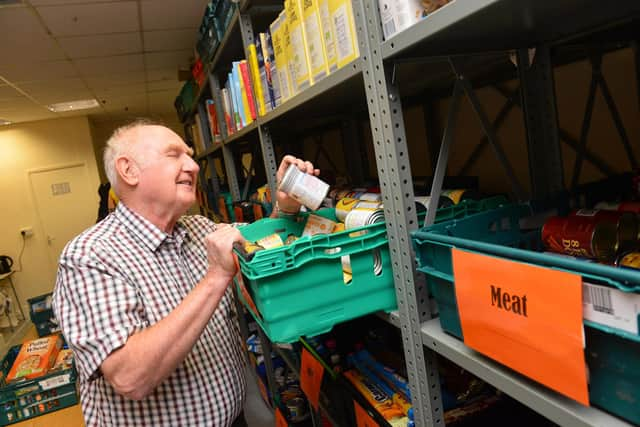‘Impossible’ – Sunderland food banks and support groups react to latest escalating energy bills
and live on Freeview channel 276
The plea comes as average energy bills are now forecast to hit a whopping £4,266 by January, up £650 from the previous prediction.
It’s a situation which support groups across Wearside say is “unsustainable” for low and even medium income households.
Advertisement
Hide AdAdvertisement
Hide AdLee Nicholson, 43, runs Building Blocks Day Centre in Concord, a community organisation set up to help people in the local area.
He said: “Everyone is saying the same thing – that they don’t know how they are going to pay energy bills which are now three times higher than three years ago. I know of parents who’ve been going without food to feed their kids and this is only going to make the situation worse.
"I’m concerned myself. Our son has a heart condition which makes it difficult for him to regulate his temperature and so during the winter we need to be able to keep the house warm.
"You see these energy companies making billions in profit. I think they’re exploiting the situation and this shouldn’t be allowed when people are facing the very real choice of eating or heating.”


Advertisement
Hide AdAdvertisement
Hide AdOne of the biggest areas of concern is the impact of the rises on the elderly.
Tracy Collins from Age UK Sunderland said: “Rising energy bills are a real concern for older people who face a stark choice of eating or heating. Some may choose not to eat to be able to heat their homes but this can also leave them vulnerable to hypothermia and so it’s vital they can do both.”
While help is at hand for those on pension credit, in the form of a £650 payment, Tracy is concerned not everyone eligible will benefit.
She said: “There is help there to protect the most vulnerable but there are currently three-quarters of a million people who are eligible for Government help from the package brought in by the Chancellor but have not accessed it.


Advertisement
Hide AdAdvertisement
Hide Ad"It’s really important that those who are entitled apply for it.”
The cost of living crisis, fuelled by the energy price escalation, has also led to an increased reliance on food banks and meal support.
Sunderland Soup Kitchen founder Andrea Bell said: “I’m now seeing more people who are in employment coming in for help. One woman came in last week and was really upset she could no longer put something healthy in her son’s packed lunch.
"The cost of energy is obviously an issue and I think more needs to be done to bring our own energy production back to the UK.”


Advertisement
Hide AdAdvertisement
Hide AdWashington Food Bank founder Clive Bowman feels an emergency package of support is the only short-term answer but also feels nationalisation of energy production would also reduce the drive for massive profits from private companies.
He said: “It’s impossible for people to pay these prices and come the winter there will be a real choice of to heat or eat. We are expecting demand for food support to go up but there are less people in a position to donate.”
Sunderland’s Liberal, Liberal Democrats have called on the Government to spare families from soaring energy bills by cancelling October’s price cap increase, keeping the cap for a typical British household at £1,971 a year instead of rising to over £3,400 in October.
The party say the the estimated £36 billion cost should be met by expanding the windfall tax on oil and gas company profits, and using the Government’s higher-than-expected VAT revenues as a result of soaring inflation.
Advertisement
Hide AdAdvertisement
Hide AdLiberal Democrat Councillor for Fulwell and Seaburn Malcolm Bond said: “Too many people in Sunderland are already struggling to make ends meet, and are having sleepless nights about how they will cope with the predicted rise in energy bills.


“The Government must step in now to help families and pensioners in Sunderland by cancelling the planned rise in energy bills this October.”
Retail trade union Usdaw recently surveyed its North East members, many of whom are classed as low paid, to assess the extent of the impact of the cost of living crisis and in particular soaring energy costs.
Responses revealed one in four members are missing meals every month to be able to pay their bills, an increase from 1 in 20 last year, 70 per cent are relying on insecure borrowing, and 50 per cent of employees are struggling to get to work due to petrol costs.
Advertisement
Hide AdAdvertisement
Hide AdPaddy Lillis, Usdaw General Secretary, said: “It is heart-breaking to hear these testimonies from North East workers who are in the main key workers that we rely on for essential services.
“Many respondents talked of how increased fuel prices were leading them to cut down on shifts, to ask for a transfer to a store closer to home or even to consider leaving work altogether. Worryingly, cutting down on food and skipping meals was also a common theme, as well as taking steps to reduce non-work related travel to save on fuel costs, such as visiting family or pursuing leisure activities.
“The Government has offered only sticking plasters that go nowhere near covering rising prices and bills, so there needs to be significant increases in minimum wage rates and fundamental reforms to end insecure work.”
Comment Guidelines
National World encourages reader discussion on our stories. User feedback, insights and back-and-forth exchanges add a rich layer of context to reporting. Please review our Community Guidelines before commenting.
